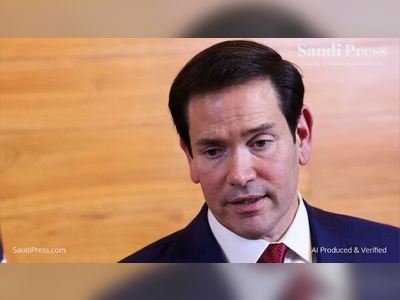
The Government Needs to Find Big Tech a New Business Model
Facebook and Google want to keep playing three roles: essential infrastructure, publisher, and targeted-ad mogul. That’s impossible.
Big Tech companies are facing an existential crisis, but they are doing everything they can to resist it and keep things just as they are. Facebook and Google, in particular, want to keep playing three roles: essential infrastructure, publisher, and targeted-ad mogul. They want to be perceived as neutral platforms, while also being perceived as civically responsible, while also maximizing surveillance and the targeting of ads. That’s impossible—so the government has to force them to choose a new business model; or, rather, it has to choose for them.
Facebook and Google occupy an unprecedented political role. The closest we’ve come in America is the telegraph monopoly in the late 19th century, when the Associated Press and Western Union joined forces to control both news and the network through which it traveled. Facebook and Google are each like that monopoly, but combined with the surveillance regimes of authoritarian states, and the addiction business model of cigarettes. Not only do they control discourse, surveil citizens, and make money from incentivizing paranoia, hatred, and lies; they also make money by keeping the public addicted to their services. Traditional news organizations are dependent on them, and their profit stream takes directly from those traditional organizations, which, if allowed to thrive, might provide a connective tissue of facts for democracy. And these tech companies lack democratic accountability: A few corporate CEOs decide the shape of modern thought and have become America’s de facto commissioners of information.
People from across the political spectrum now understand the threat that these companies pose to democracy. The question has thus become not whether they are regulated, but how. “The Big Tech reckoning must come,” Republican Representative Ken Buck has warned, while left-wing darling Representative Alexandria Ocasio-Cortez argues that Big Tech monopolies are journalism killers, and “societally & economically unsustainable.” Republican Governor Ron DeSantis of Florida is pushing a law that fines Big Tech companies that ban politicians, and Democratic Senator Amy Klobuchar says that breaking up Facebook is “on the table.”
Some may argue that, as we learn of their abuses, these tech giants could be forced to compete. The innovation of upstarts could, on its own, lead to a decentralized, nontoxic market. This argument was destroyed by the investigation of the House’s antitrust subcommittee, which showed how Big Tech firms build moats around their power, destroying upstarts by buying them or burying them before they get a chance to compete.
Downsizing Facebook and Google has widespread backing. Liberals and conservatives support splintering these companies so that their extraordinary power doesn’t eat democracy whole. That means, for instance, breaking off YouTube, the video platform, from Google, the search platform, from Google Shopping, which competes on the search platform. That means breaking up Facebook and Instagram and WhatsApp, and Messenger and other affiliate applications. The House antitrust subcommittee’s report from 2020 points toward a structural-separation law, which would bar Facebook or Google from owning any content companies that compete on their platforms.
But breakups alone, clearly crucial, are just as clearly not enough. Any serious reform of the democratic harms caused by Facebook or Google have to start with compelling these companies to serve the public interest. Some think the best way to do that is by forcing them to accept their role as publishers.
The New York Times can’t negligently publish libel against a private person, violate copyright, or run advertisements that violate the Fair Housing Act. Right now, Facebook and Google are immune from these rules because of Section 230. That controversial component of the 1996 Communications Decency Act treats tech companies as mere platforms that aren’t exerting editorial control, giving them license to ignore the harms that might be caused on those platforms. They are having their cake and eating it too, at great cost to the public. Does Amtrak keep allowing a scam artist on the train to defraud you? You can try to sue, if you can show that Amtrak was negligent. Not so with YouTube, which uses 230 as a shield.
I support the efforts to repeal parts of 230. In particular, I think any company should be held liable for the content it promotes, paid or unpaid. Repeal alone, however, doesn’t address the centralized control of speech by a handful of tech companies. Facebook and a few others could still decide to classify Occupy Wall Street as a terrorist organization, for example, or decide that double-masking criticism (or promotion) is a conspiracy theory, or decide to devalue certain political debates in search results—for self-interest, because of targeted pressure, or on a whim. Repeal doesn’t change the incentives to promote high-conflict material. It doesn’t address mass civic surveillance.
That’s why 230 repeal is ultimately just a sideshow. The real way forward—bear with me—is making these companies look a bit more like the platforms that 230 envisioned; that is, forcing them to embrace their role as essential infrastructure.
This is the path that the United States has taken in the past when faced with privately owned goods or services that have become indispensable to public life—such as roads and railroads—and the path that has defined its approach to communications infrastructure in particular. State statutes from the mid-18th century required telegraph companies to treat all comers equally. Graham Bell got a telephone patent in the 1870s; when it expired in the 1890s, the telephone industry took off in the U.S. Then in 1910, Congress passed the Mann-Elkins Act, regulating the telephone-service providers as “common carriers” because of their central role in communication. They could still be privately owned, but they took on a public obligation not to discriminate among different users.
Some people might argue that search and social media are optional, not infrastructure, more like video games than cable lines. But that point of view ignores reality. They count as infrastructure because much of society depends on them for connection. Small businesses need Facebook and Google to reach customers. Politicians need them to reach constituents. For many people, they stand in for the sidewalks, post offices, telephone lines, and public squares, all bundled together. News organizations live and die by access to audiences through these companies.
In most American law, infrastructure is subject to different rules than other consumer goods. It is treated as a public utility and regulated in the public interest. Companies that maintain infrastructure are not allowed to charge different prices for different people who want access to it. Communications infrastructure is banned from spying on those who use it. The Postal Service can’t open mail, and it can’t charge one marketer $5, and another $10, to send the same poundage of bulk mail. Telephone companies can charge different rates for different kinds of calls, but they can’t charge different people different rates, or listen in on calls and use what they learn for marketing.
Applying the nondiscrimination principle to Facebook and YouTube could play out in various ways. Congress has broad authority to regulate the business model of public utilities, and it could ban targeted advertising or any form of algorithmic amplification. Another option would be to ban all advertising, targeted or not, meaning that the platforms would be funded either by non-targeted ads or a subscription service. Instead of ads, YouTube might cost $10 a month, roughly as much as Amazon Prime. Instead of picking and choosing what content is likely to appeal to users—or, put more cynically, to addict users—Facebook would serve up content in the order that it was put on the platform. The upshot of public-utility regulation is that citizens would have their choice among a handful of platforms administered by technology companies and, separately, news outlets run by (hopefully) responsible publishers.
Big Tech doesn’t want any reform. It will spend billions of dollars trying to persuade us all to do nothing. And, because the tech companies finally decided to throttle Donald Trump, and to kick off anti-vaxxers, progressives may be tempted to believe that doing nothing is, in fact, the best option. So long as Facebook’s Mark Zuckerberg and Google’s Sundar Pichai make the decisions that progressives might like, we are relieved of either justifying a governmental ban, or allowing speech that we might not want to exist. It allows us to pay lip service to the expansive mid-20th-century version of the First Amendment, and the importance of a thriving, open, public sphere, instead of proposing a more curbed First Amendment or defending the right of those with horrific views to speak. Facebook, in particular, understands this dynamic, and even hired a group of elite academics and journalists and made a large public show of giving them power to override a fraction of Zuckerberg’s decisions. The goal of the Facebook Oversight Board is clearly to give the public comfort that speech decisions are made by philosopher kings, not investors who want to maximize behavioral-targeting profits—and to stave off legal reforms.
Those who are drawn to this apparent safety should be aware that they are effectively endorsing an alternative to a democracy. The jurist Louis Brandeis famously said, “We can have democracy in this country, or we can have great wealth concentrated in the hands of a few, but we can’t have both.” That statement is even more apt when it comes to communications: We can have democracy, or we can have editing power in the hands of a few ad moguls, but we definitely can’t have both.
Break up the ad moguls, break up the publishers, reinstate the rule of law, recognize the public-utility role of big, networked social-media companies, and we have a fighting chance. In other words, follow the communications policy that defined American law until the 1970s: Regulate the infrastructure, enforce the common law of libel and defamation, and otherwise maximally disperse power.
Facebook and Google occupy an unprecedented political role. The closest we’ve come in America is the telegraph monopoly in the late 19th century, when the Associated Press and Western Union joined forces to control both news and the network through which it traveled. Facebook and Google are each like that monopoly, but combined with the surveillance regimes of authoritarian states, and the addiction business model of cigarettes. Not only do they control discourse, surveil citizens, and make money from incentivizing paranoia, hatred, and lies; they also make money by keeping the public addicted to their services. Traditional news organizations are dependent on them, and their profit stream takes directly from those traditional organizations, which, if allowed to thrive, might provide a connective tissue of facts for democracy. And these tech companies lack democratic accountability: A few corporate CEOs decide the shape of modern thought and have become America’s de facto commissioners of information.
People from across the political spectrum now understand the threat that these companies pose to democracy. The question has thus become not whether they are regulated, but how. “The Big Tech reckoning must come,” Republican Representative Ken Buck has warned, while left-wing darling Representative Alexandria Ocasio-Cortez argues that Big Tech monopolies are journalism killers, and “societally & economically unsustainable.” Republican Governor Ron DeSantis of Florida is pushing a law that fines Big Tech companies that ban politicians, and Democratic Senator Amy Klobuchar says that breaking up Facebook is “on the table.”
Some may argue that, as we learn of their abuses, these tech giants could be forced to compete. The innovation of upstarts could, on its own, lead to a decentralized, nontoxic market. This argument was destroyed by the investigation of the House’s antitrust subcommittee, which showed how Big Tech firms build moats around their power, destroying upstarts by buying them or burying them before they get a chance to compete.
Downsizing Facebook and Google has widespread backing. Liberals and conservatives support splintering these companies so that their extraordinary power doesn’t eat democracy whole. That means, for instance, breaking off YouTube, the video platform, from Google, the search platform, from Google Shopping, which competes on the search platform. That means breaking up Facebook and Instagram and WhatsApp, and Messenger and other affiliate applications. The House antitrust subcommittee’s report from 2020 points toward a structural-separation law, which would bar Facebook or Google from owning any content companies that compete on their platforms.
But breakups alone, clearly crucial, are just as clearly not enough. Any serious reform of the democratic harms caused by Facebook or Google have to start with compelling these companies to serve the public interest. Some think the best way to do that is by forcing them to accept their role as publishers.
The New York Times can’t negligently publish libel against a private person, violate copyright, or run advertisements that violate the Fair Housing Act. Right now, Facebook and Google are immune from these rules because of Section 230. That controversial component of the 1996 Communications Decency Act treats tech companies as mere platforms that aren’t exerting editorial control, giving them license to ignore the harms that might be caused on those platforms. They are having their cake and eating it too, at great cost to the public. Does Amtrak keep allowing a scam artist on the train to defraud you? You can try to sue, if you can show that Amtrak was negligent. Not so with YouTube, which uses 230 as a shield.
I support the efforts to repeal parts of 230. In particular, I think any company should be held liable for the content it promotes, paid or unpaid. Repeal alone, however, doesn’t address the centralized control of speech by a handful of tech companies. Facebook and a few others could still decide to classify Occupy Wall Street as a terrorist organization, for example, or decide that double-masking criticism (or promotion) is a conspiracy theory, or decide to devalue certain political debates in search results—for self-interest, because of targeted pressure, or on a whim. Repeal doesn’t change the incentives to promote high-conflict material. It doesn’t address mass civic surveillance.
That’s why 230 repeal is ultimately just a sideshow. The real way forward—bear with me—is making these companies look a bit more like the platforms that 230 envisioned; that is, forcing them to embrace their role as essential infrastructure.
This is the path that the United States has taken in the past when faced with privately owned goods or services that have become indispensable to public life—such as roads and railroads—and the path that has defined its approach to communications infrastructure in particular. State statutes from the mid-18th century required telegraph companies to treat all comers equally. Graham Bell got a telephone patent in the 1870s; when it expired in the 1890s, the telephone industry took off in the U.S. Then in 1910, Congress passed the Mann-Elkins Act, regulating the telephone-service providers as “common carriers” because of their central role in communication. They could still be privately owned, but they took on a public obligation not to discriminate among different users.
Some people might argue that search and social media are optional, not infrastructure, more like video games than cable lines. But that point of view ignores reality. They count as infrastructure because much of society depends on them for connection. Small businesses need Facebook and Google to reach customers. Politicians need them to reach constituents. For many people, they stand in for the sidewalks, post offices, telephone lines, and public squares, all bundled together. News organizations live and die by access to audiences through these companies.
In most American law, infrastructure is subject to different rules than other consumer goods. It is treated as a public utility and regulated in the public interest. Companies that maintain infrastructure are not allowed to charge different prices for different people who want access to it. Communications infrastructure is banned from spying on those who use it. The Postal Service can’t open mail, and it can’t charge one marketer $5, and another $10, to send the same poundage of bulk mail. Telephone companies can charge different rates for different kinds of calls, but they can’t charge different people different rates, or listen in on calls and use what they learn for marketing.
Applying the nondiscrimination principle to Facebook and YouTube could play out in various ways. Congress has broad authority to regulate the business model of public utilities, and it could ban targeted advertising or any form of algorithmic amplification. Another option would be to ban all advertising, targeted or not, meaning that the platforms would be funded either by non-targeted ads or a subscription service. Instead of ads, YouTube might cost $10 a month, roughly as much as Amazon Prime. Instead of picking and choosing what content is likely to appeal to users—or, put more cynically, to addict users—Facebook would serve up content in the order that it was put on the platform. The upshot of public-utility regulation is that citizens would have their choice among a handful of platforms administered by technology companies and, separately, news outlets run by (hopefully) responsible publishers.
Big Tech doesn’t want any reform. It will spend billions of dollars trying to persuade us all to do nothing. And, because the tech companies finally decided to throttle Donald Trump, and to kick off anti-vaxxers, progressives may be tempted to believe that doing nothing is, in fact, the best option. So long as Facebook’s Mark Zuckerberg and Google’s Sundar Pichai make the decisions that progressives might like, we are relieved of either justifying a governmental ban, or allowing speech that we might not want to exist. It allows us to pay lip service to the expansive mid-20th-century version of the First Amendment, and the importance of a thriving, open, public sphere, instead of proposing a more curbed First Amendment or defending the right of those with horrific views to speak. Facebook, in particular, understands this dynamic, and even hired a group of elite academics and journalists and made a large public show of giving them power to override a fraction of Zuckerberg’s decisions. The goal of the Facebook Oversight Board is clearly to give the public comfort that speech decisions are made by philosopher kings, not investors who want to maximize behavioral-targeting profits—and to stave off legal reforms.
Those who are drawn to this apparent safety should be aware that they are effectively endorsing an alternative to a democracy. The jurist Louis Brandeis famously said, “We can have democracy in this country, or we can have great wealth concentrated in the hands of a few, but we can’t have both.” That statement is even more apt when it comes to communications: We can have democracy, or we can have editing power in the hands of a few ad moguls, but we definitely can’t have both.
Break up the ad moguls, break up the publishers, reinstate the rule of law, recognize the public-utility role of big, networked social-media companies, and we have a fighting chance. In other words, follow the communications policy that defined American law until the 1970s: Regulate the infrastructure, enforce the common law of libel and defamation, and otherwise maximally disperse power.











